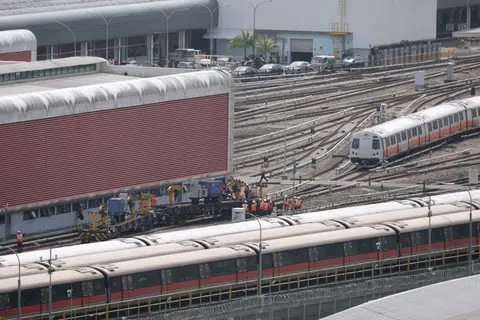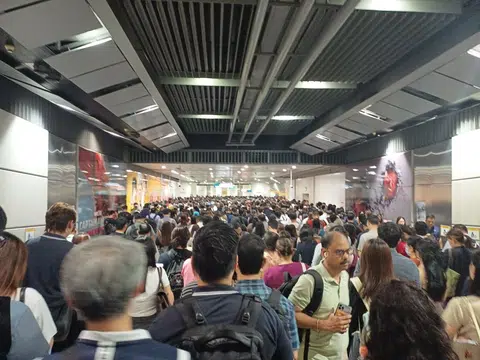No systemic issue with rail operators in MRT delays, so no need for COI
There is no systemic issue with rail operators SBS Transit and SMRT regarding the three MRT delays in early February, so the Government will not convene a committee of inquiry (COI), said Transport Minister Chee Hong Tat.
"There isn't a systemic issue or concern with SBS Transit or SMRT that, I think, will change our position on the necessity for a COI," he added.
Mr Chee was responding in Parliament to a question by Progress Singapore Party Non-Constituency MP Leong Mun Wai on Feb 26, which was among several questions about the three rail delays on the North-South, North East and Circle lines over a span of five days earlier in February.
Mr Leong had asked if Mr Chee would convene a COI this time for the three incidents, given that his previous call for a COI for a major East-West Line (EWL) breakdown was rejected.
Reiterating that the Land Transport Authority (LTA) is still looking into the root causes of the three incidents in February, Mr Chee said the authority will do its best to identify the learning points and share them with the operators.
He referred Mr Leong to his ministerial statement in October 2024, when he explained why a COI was not convened for the breakdown that led to a six-day disruption along a stretch of the EWL in September 2024, which affected about 2.6 million passengers.
Mr Chee added that LTA, as the rail regulator, is "empowered" to conduct thorough investigations and share the findings publicly.
He had said in October 2024 that LTA will do a thorough investigation to ascertain what happened and identify areas for improvement, as the regulator has the "necessary regulatory powers and technical knowledge" to investigate serious rail incidents.
In December 2011, then Prime Minister Lee Hsien Loong had ordered a COI after three breakdowns in four days on the North-South Line.
Mr Chee stressed that although the incidents in February 2025 happened in quick succession, they are unrelated to one another and to the EWL train breakdown in September 2024.
Mr Leong had also asked whether LTA would look into potential problems in staffing, staff turnover, skill level and morale in the engineering and maintenance departments of operator SMRT, beyond the hardware issues.
To this, Mr Chee said that the authorities have been looking into these issues, and will review the whole system of operations and maintenance.
The minister also provided updates on the early findings of the investigations into the three recent rail delays.
First, for the incident along the North-South Line (NSL) on Feb 7, he said that only three out of 39 trains that were scheduled to serve the line had been launched from Bishan Depot when the engineering vehicle broke down at a railway crossing in the depot at around 5.15am.
As a result, SMRT had to redirect some trains from the EWL to the NSL, creating longer waits for trains on both lines.
When SMRT tried to move the stalled engineering vehicle using a rescue train, some of the wheels of the engineering vehicle came off the rails. The derailed vehicle prevented trains serving the NSL from leaving the depot.

Mr Chee added that SMRT had to use hydraulic equipment to slowly lift and shift it off the tracks, and finished doing so only at around 5.30pm. Trains were successfully launched from Bishan Depot at 6.36pm.
Hougang MP Dennis Tan asked if engineering vehicles are subject to the same maintenance standards as passenger trains, and if SMRT would look at better service recovery of stalled engineering vehicles along the tracks.
Mr Chee replied that these engineering vehicles are not subject to the same maintenance regime as regular MRT trains, and that LTA is still investigating why the engineering vehicle broke down.
On service recovery, Mr Chee said SMRT "tried their very best" to move the train as quickly as possible by sending the rescue train to push the stalled engineering vehicle. But, as the wheels of the engineering vehicle had come off, the process became more time-consuming and labour-intensive.
On the North East Line (NEL) incident on Feb 10, Mr Chee noted that it was caused by a signalling fault near Buangkok station at around 6.08am, which prevented trains from being controlled automatically. As such, they had to be driven manually and at slower speeds.
Early investigations showed that the signalling fault was caused by a malfunctioning electronic card in the signalling system, and there were no prior signs of malfunction during maintenance checks.
SBST then replaced the malfunctioning electronic card and restored the operation of the signalling system at around 8am. The electronic card has been sent to the system manufacturer for further examination.
Lastly, on the Circle Line (CCL) incident on Feb 11, Mr Chee said further investigations showed that the incident was due to a signalling fault, and not a power trip, as previously indicated.
After the signalling fault caused a temporary loss of communication between the train and the trackside signalling equipment at about 8.15am, one of the CCL's trains engaged its brakes and stopped moving, in accordance with safety protocols.
For safety, the other trains near it also came to a stop. Mr Chee noted that 17 trains between Paya Lebar and Marymount stations were temporarily halted.
But when train operations were being restored, SMRT noticed that the central automatic train supervision system, which manages the movement of driverless trains, became less responsive and it took longer than usual to resume normal train operations.

Mr Chee said there was a similar issue with the system in September 2024, and LTA and SMRT had worked with manufacturer Alstom to develop a software patch to deal with the issue. The patch underwent extensive testing and was ready for deployment on Feb 15.
"Unfortunately, the incident happened a few days before the deployment date," he added. SMRT and Alstom have since successfully deployed the patch.
Mr Chee said the three incidents did not result in a prolonged stoppage of train services.
But he acknowledged that they occurred during the morning peak hours and affected a large number of commuters, increasing their waiting and travel times.
As at Feb 25, trains on the entire MRT network clocked an average of two million train-kilometres without service delays of at least five minutes, said Mr Chee.
He added that all MRT lines have hit the rail reliability target of at least one million train-km between such delays.
In response to a question by Mr Tan on improving communication with passengers during train incidents, Mr Chee said LTA will continue to see how this can be fine-tuned, especially during peak hours.
Esther Loi for The Straits Times